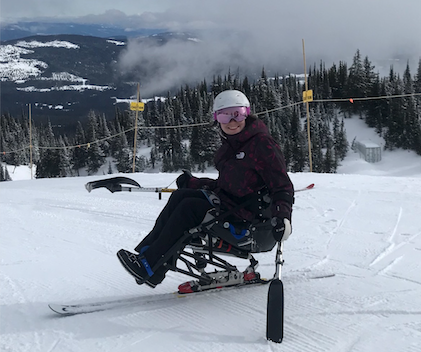Growing up, Maddie Watts had a tendency to bounce around, mostly between her home in Metro Vancouver, Toronto— where she went to school—and Nova Scotia.
One constant was her days spent skiing in Whistler each winter.
“I’ve been skiing since I was two years old, and skiing Whistler since I was two as well,” said the 19-year-old, who’s now in her second year at Bishop’s University in Quebec. “I was a standing skier for years and years. I did racing; I did some snow-cross kind of stuff; I did teaching as well. I spent a lot of time on the mountain.”
That is, until she collapsed and passed out one day while working her summer job as a restaurant host three years ago.
“The pain went from me being fully able-bodied to the next day being unable to walk independently,” recalled Watts. “It was just kind of like zero to 100.”
After a seemingly endless series of tests, surgeries, treatments and months spent travelling back and forth to the hospital, doctors eventually determined Watts was suffering from facet joint degenerative syndrome—an aggressive form of arthritis attacking the lower portion of her spine. Watts is now dependent on a walker or wheelchair to get around.
Though arthritis is the most common chronic health condition in Canada, affecting about 1 in 5 people—over half of whom are under the age of 65, according to Canada's Arthritis Society—Watts' particular condition usually affects people in their 70s or 80s, making her diagnosis “super peculiar,” she said. She also suffers from additional spinal conditions, including spondylolisthesis—“essentially the narrowing of the space where your discs exist, between your vertebrae,” she explained—and scoliosis. But the main issue affecting her daily life is the spinal arthritis and debilitating pain brought on by facet joint syndrome.
“Because mine degenerated at such a quick speed, the arthritic damage of it is something that would happen, generally, at the age of, like, 90 to 95 years old,” she said.
'There [were] a lot of aspects of my life that I had to lose'
Even with the chronic pain and long list of treatments Watts continues to receive, among the most devastating knock-on effects of her condition is its effect on her favourite sport. After herniating one of her spinal discs last fall, Watts realized skiing was no longer an option.
“The past two years I’d been sort of skiing, like I would do two runs a day, twice a week. The problem with it was the payoff for the next couple days was a lot more pain—but it was an equal balance of joy versus pain,” she said.
“I think it’s sort of an un-talked-about thing for people with chronic pain: you create this scale in your head of how much joy [an activity will bring you] to how much pain will you be able to go through. And I decided that this year, I really just couldn’t standing-ski anymore; it wasn’t going to be worth it.”
But in that grief, Watts discovered a silver lining earlier this winter.
“My dad [asked], ‘Would you like to try sit-skiing?’ And I was like, ‘You know what? I think I would; I think it’s time,’” Watts remembered, recalling her nervousness that she wouldn’t feel the same way about this new form of skiing.
Instead, “I took to it beautifully,” she said. “I loved it; it was amazing.”
In the two-month period following her first session with Whistler Adaptive, Watts earned her Canadian Adaptive Snowsports (CADS) Level 1 and Level 2 teaching certifications. After deciding to forego her winter semester at school in favour of staying in Whistler to heal her herniated disc, work as an instructor with Whistler Adaptive and get more comfortable in her sit-ski herself. Watts even received an invitation from the Canadian Paralympic Committee to train, learn and ski with other adaptive athletes at the CADS festival in Sun Peaks this March. The experience earned Watts another invitation to compete in a series of Ontario sit-skiing races next year.
Now, her sights are set on the 2026 Winter Paralympics in Italy.
After the onset of her symptoms, “There [were] a lot of aspects of my life that I had to lose ... I was a mountain biker and a backpacker, I did sea kayaking, I had a lot of things that I had to let go of, and that was really hard and super alienating,” explained Watts. “I felt very strange, just extremely not normal. And a lot of my relationships are strained because of this.”
But when it comes to her newfound love for sit-skiing, she added, “I’m so grateful to have gotten these kinds of silver linings. I think I’ve learned a lot more about myself as a person and what I value in myself, and I think that I’ve also gotten a greater perspective for what it’s like to live with disabilities ... I’ve been really lucky with this whole sit- skiing journey making it kind of bearable for me, because I got something great again, something I really never expected. It’s super out of left field—I did not think I would ever be training for any kind of Olympic games— but I’m so excited about it.”




